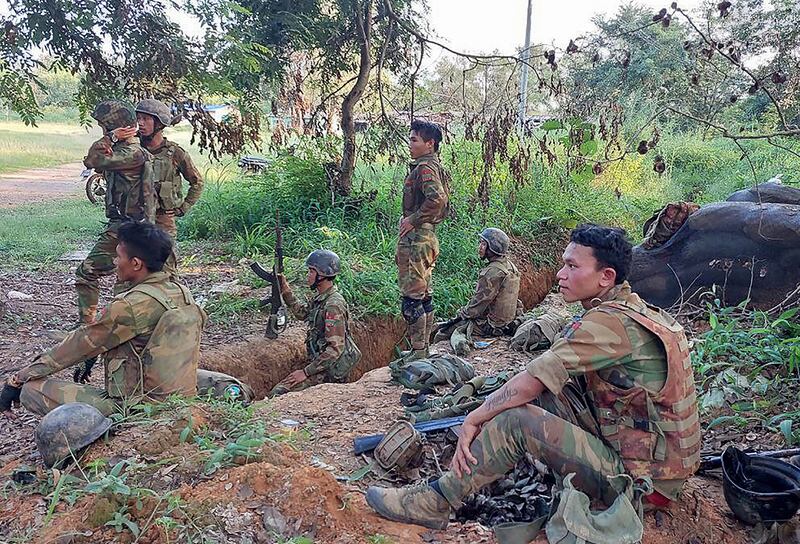Myanmar’s junta forces now control less than half the country after suffering major battlefield setbacks in 2024 -– including the loss of command headquarters in Shan and Rakhine states, several rebel groups said.
In June, the Three Brotherhood Alliance of ethnic armies resumed offensive operations in Shan state. Within weeks, the Myanmar National Democratic Alliance Army had captured Lashio, a city of 130,000 that is the region’s commercial and administrative hub and a gateway to China.
Another member of the alliance, the Ta’ang National Liberation Army, also seized the strategic Shan state townships of Nawnghkio and Kyaukme, as well as the gem mining town of Mogoke in neighboring Mandalay region.

Those victories in July and August left the junta with almost no territory in Shan state, a key area for border trade with China.
“The junta’s administration has completely ended here,” said a resident of Kutkai, a town in northern Shan state that has been the focus of junta airstrikes in recent months.
“At present, the economy and education sectors cannot function,” the resident told Radio Free Asia. “And the cost of living has skyrocketed.”
RFA couldn’t independently confirm the exact area lost by the military regime as the situation on the ground remains fluid and hard to verify given the constant fighting.
Junta spokesperson Maj. Gen. Zaw Min Htun didn’t immediately respond to RFA’s attempt for comment on Monday.
Election plans for 2025
The setbacks came as the junta regime moved forward with plans to hold an election in 2025, four years after they seized power in a Feb. 1, 2021, coup d’etat.
But opponents say the election would be a farce and simply a way of legitimizing their rule.
For starters, the vote would be held in just 161 townships controlled by junta authorities out 330 nationwide, Election Commission Chairman Ko Ko told political party representatives earlier this month.

Kyaw Zaw, a spokesperson for the shadow National Unity Government’s Presidential Office, told RFA that the military junta really only controls only about a third of the country, including the major cities of Yangon, Mandalay and the capital, Naypyidaw.
“But even in those areas, security is far from stable,” he said. “The regions controlled by rebel forces have expanded, increasing our responsibilities for providing public services.”
Local residents and insurgent forces said territory under junta control has declined in central Sagaing, Magway and Mandalay regions, where fierce fighting between the military and anti-junta forces has been constant since coup.
Ethnic rebel groups now also control large areas in Kachin state in the north and in Kayin state in the country’s east.
In Kayah state in eastern Myanmar, ethnic rebel groups have seized about 80% of the territory, according to Banyar Khun Aung, a vice secretary of the anti-junta Karenni State Interim Executive Council.
In each of the occupied cities in Kayah state, departments of administration, law and order, security, education, livestock, health and maternity and child care centers have been set up, he said.
“We have established administrative mechanisms in all the currently controlled areas,” he said.
Rakhine state
In Rakhine -– Myanmar’s westernmost state -- the Arakan Army has captured 13 of 17 townships from the junta, a resident who requested anonymity for security reasons told RFA.
“Many areas of Sittwe city are already under their control,” he said. “Only Kyaukphyu, with Chinese investments, and the island town of Munaung are fully under the control of the military regime.”
Arakan Army fighters captured the junta’s western command headquarters in Ann township on Dec. 20.
Elsewhere in Rakhine, the military has been reinforcing troops in areas that it does control, residents said earlier this month. That includes Kyaukphyu, where China has plans for a port as well as energy facilities and oil and gas pipelines that run to its Yunnan province.
In neighboring Chin state, ethnic rebels captured two townships last week, Chin Brotherhood Alliance spokesperson Salai Yaw Mang said. Several anti-junta groups are now in control of about 85 percent of the state, he said.
Forced recruitment
In Shan state, to the northeast, ethnic armed groups control 24 townships, with just Tangyang, Mongyai and Muse still held by the junta. The capture of the northeastern command headquarters outside of Lashio in late July was one of the most significant losses for the military in years.
In total, ethnic armed groups and allied forces have seized 86 towns across the country, the Myanmar Peace Monitor of Burma News International reported on Dec. 23.
In Sagaing, in central Myanmar –- viewed as a homeland for the majority ethnic Bamar people –- a major junta offensive is expected sometime next year, according to Htoo Khant Zaw, a spokesperson for the People’s Defense Comrade group based in Sagaing’s Ye-U township.
“The regime is still forcibly recruiting young people, even in the cities,” he said. “They are providing training, and the offensive is expected to be launched by land and air in 2025.”
Translated by Aung Naing. Edited by Matt Reed and Malcolm Foster.
